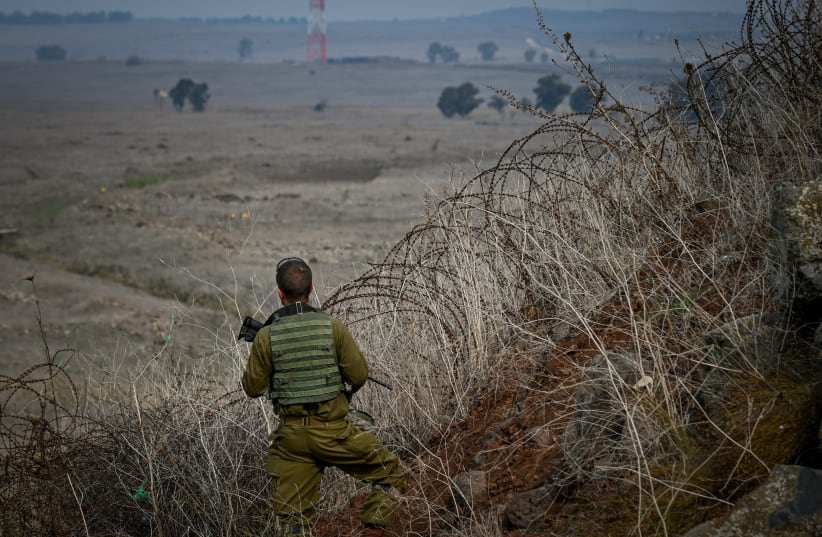News
IDF takes over Syrian Hermon, strikes Syrian chemical weapons factory

The military also stated it would not get involved in any internal occurrences in Syria, provided that no forces in Syria endanger Israeli security interests.

The IDF, on Sunday afternoon, took over the Syrian side of the Mount Hermon mountain range to expand a demilitarized buffer zone along the border with Syria and also at several other points of significance for defense.
The Hermon range has always been thought of as providing a strategic advantage because it provides high ground for the entire area, enabling Israel to anticipate any potential invading force further in advance.

The military also stated it would not get involved in any internal occurrences in Syria, provided that no forces in Syria endanger Israeli security interests.
Earlier Tuesday, the IDF struck a chemical weapons factory belonging to the regime of former Syrian president Bashar Assad to prevent the rebels from seizing it, Arab media first reported on Sunday, and The Jerusalem Post later independently confirmed.
In addition, IDF sources responded about whether the air force had attacked Syrian chemical weapons, saying that the military follows developments that could endanger Israel and takes the necessary steps to attack any such dangerous threats.

Israeli soldiers take a position in the Golan Heights, near the Israeli border with Syria, northern Israel, December 8, 2024 (credit: MICHAEL GILADI/FLASH90)
Israel’s position has always been to avoid conflict with Syria where possible but not to permit dangerous developments regarding advanced weapons, and it has carried out thousands of air strikes within Syria – usually only admitting to a small number of specific strikes – dating back over a decade since Syria’s civil war started.
IDF reinforces Golan Heights
For example, it would be against Israeli interests for chemical weapons to fall into the hands of unpredictable actors, such as some of the more jihadist rebel groups.
These attacks increased in recent months after the IDF decapitated much of Hezbollah’s leadership and started to also eliminate significant Hezbollah and Iranian interests in Syria.
On Saturday, opposition sources speaking with Channel 12 noted their wish for peace in the region.
Further, on Saturday, IDF Chief of Staff Lt .-Gen. Herzi Halevi said on a visit to the Syrian border that the IDF was “monitoring to ensure that local elements aren’t moving in our direction,” with a “very strong offensive and defensive response,” prepared should the need arise.
Earlier, the military noted that in accordance with a situational assessment, the IDF had decided to reinforce troops for defense purposes throughout the Golan Heights region bordering Syria.
“The reinforcement of forces will enable strengthening the defense in the area and the preparation of forces for various scenarios in the sector,” the IDF’s statement read.
In the early hours of Sunday, the Syrian military’s command informed officers that the regime of President Bashar al-Assad had ended, with Syrian rebels announcing Damascus had been freed.
Reuters and Maya Gur Arieh contributed to this report.

News
Ganduje condoles Katsina Governor, Radda over mother’s demise

The National Chairman of the All Progressives Congress (APC), Dr. Abdullahi Umar Ganduje, has expressed his heartfelt condolences to the Governor of Katsina State, Malam Dikko Umar Radda, over the passing of his mother, Hajiya Safarau Umar Baribari.

In a statement issued by his Chief Press Secretary, Edwin Olofu, Dr. Ganduje described Hajiya Safarau’s death as a profound loss that has left a deep void in the hearts of her family, friends, and the people of Katsina State.

Extending his sympathies, the APC National Chairman condoled with Governor Radda, the bereaved family, and the entire people of Katsina State during this difficult time.
He acknowledged the remarkable contributions of the late Hajiya Safarau and prayed for Almighty Allah (SWT) to grant her eternal rest in Jannatul Firdaus while strengthening the family to bear this irreplaceable loss.
Dr. Ganduje urged Governor Radda and others affected to find comfort in the cherished memories and enduring legacy of the deceased.
Reaffirming the APC’s support, the former Kano State governor assured the people of Katsina State of the party’s solidarity in their time of grief and prayed that Allah (SWT) grant the departed soul Al-Jannah Firdaus. Ameen.

News
Hajia Aishat Jibrin offers cash, food items to widows, vulnerable persons in Kogi

The wife of Senator Isah Jibrin (Echocho), Hajia Aishat has offered cash and food items worth millions of naira to widows and vulnerable women across Dekina local government Councils, promises to take similar gesture across the nine local government in Kogi East.

The exercise which was tagged: “Widows Empowerment”, saw the Senator’s wife distributing cash and food items to cushion the effect of Ramadan.

Items distributed are bags of rice bags of salt, cartons of seasoning, maggi etc, which were evenly distributed to widows and vulnerable women across party lines.
A beneficiary who spoke with our correspondent at Odu in Dekina Local Government Council, Hon Fitumi thanked Hajia for her continuous effort in coming through for widows and vulnerable regularly.
She acknowledged similar gesture by Senator Isah Jibrin (Echocho), a fortnight ago at Ankpa when youths in their numbers from three Local Government Areas were trained in Agriculture and empowered, stressing that people are now living testimony to the effort of the lawmaker.
“”We are aware of several intervention projects, empowerment and developmental projects of Senator Echocho and we are not surprised seeing Hajia toeing the similar path.
“The distribution of food items and cash today is not only a rekindling of hope to the beneficiaries, but an encouragement that despite their condition, they were not forgotten.
Hajia Labran, and other APC Women leaders who spoke on behalf of women, applauded Hajia Aisha Echocho and pray Allah to strengthen her to carry on, urged others to emulate her sustainable initiatives.
The women advised other political office holders to emulate what is good and just, which they believed would strengthen the party.

News
Unical confers Doctoral Degree on Unoma Akpabio

As part of the activities to celebrate the golden anniversary of the University of Calabar, the wife of the President of the Senate, Mrs Ekaette Unoma Godswill Akpabio was on Saturday, March 22, 2025 conferred with an honorary doctorate degree in Education Management.

The ceremony held at the main campus of the institution in Calabar, Cross River State also saw the Minister of the Federal Capital Territory, Chief Nyesom Wike awarded the honorary doctorate degree in Law.

Other awardees included Major General Moses Bisong Obi (rtd) (Doctor of Peace and Conflict Studies) and Supreme Court Justice, Emmanuel Akomaye Obi (Doctor of Law).
In her acceptance speech after the conferment by the 15th Emir of Kano and Chancellor of the University, Alhaji Aminu Ado Bayero, the wife of the Senate President, Mrs Akpabio thanked the Governing Council and Management of the University for finding her worthy of the honour.
A statement by the Special Assistant on Media/communication to the President of the Senate, Anietie Ekong quoted Mrs Akpabio as saying “I am happy to be honoured with this award from the prestigious University of Calabar that I have heard so much about from my dear husband, an alumnus of this great institution.
“I was wondering when I will join him as a great Malabress and that day has come and I am grateful to the University for this honour,” she said.
Mrs Akpabio promised to work with other awardees especially the Minister of the FCT to provide infrastructural assistance to the university.
In a citation the University extolled Mrs Akpabio for her philanthropic and humanitarian efforts towards uplifting the lives of women and the vulnerable of the society through her non governmental organisation, the Family Life Enhancement Initiative.
She was also recognized as a Champion of women’s rights and as one who used her position as the First Lady of Akwa Ibom State to fight for the inclusion of more women in governance.
On his part, Chief Wike said he was honoured to be among the recipients of award. He extolled the Visitor of the University, President Bola Tinubu for working tirelessly to promote tertiary education in the country.

-

 News6 days ago
News6 days agoBill to establish National Cashew Production and Research Institute in Kogi passes first reading in Senate
-

 News6 days ago
News6 days agoReport of attack on Wike’s Port Harcourt residence false, misleading – Police
-

 News6 days ago
News6 days agoShehu Sani debunks Governor Uba Sani’s alleged diversion of LG funds, challenges El-Rufai to publicly tender evidence
-

 News5 days ago
News5 days agoPlateau gov’t expresses concern over violence in Shendam LGA, calls for calm
-

 Sports1 week ago
Sports1 week agoMerino gives Arsenal win over Chelsea
-

 Interview7 days ago
Interview7 days agoSenators Natasha-Akpabio saga should have been resolved privately – Rev. Mrs Emeribe
-

 Politics3 days ago
Politics3 days agoOpposition leaders announce coalition to challenge Tinubu in 2027
-

 News1 week ago
News1 week agoAs Committee Chairman, I did not authorise Natasha to petition IPU over her suspension from Senate – Jimoh Ibrahim




















